- Home
- Robert Hellenga
Love, Death & Rare Books Page 2
Love, Death & Rare Books Read online
Page 2
We read everything we could find about sex for our library project in science—everything from Krafft-Ebing’s Psychopathia Sexualis, in a translation of the seventh enlarged and revised German edition (1894) by Charles Gilbert Chaddock (on a shelf next to the library table), to Nancy Friday’s My Secret Garden: Women’s Sexual Fantasies. And our joint report on Psychopathia Sexualis, which contains a total of 238 case histories of human sexual behavior, created a sensation at the Lab School, especially the account of the man who drank the urine of a nine-year-old boy after performing fellatio on him. Parents complained to the director, who complained to our parents, and there was a fuss about First Amendment rights and freedom of speech.
Krafft-Ebing gave us a lot to wonder about, and the report made us heroes of a sort. Our classmates started coming into the shop to have a look, some of the girls, too, including Alice Archer, the only girl I’d ever kissed, though I’d often undressed her in my imagination. We tried not to draw attention to our gatherings at the long table, but either Dad got wind of them, or else he simply stumbled upon us by accident. It was an interesting moment. We froze. But Dad didn’t scold us. Instead of scolding, he talked about the publication history of the book. We had four different editions in the shop, including the first German edition (in “Modern Firsts” in the rare book room). Later editions, he explained, were quite different from the first, and some of the bindings were very interesting, but by this time, the report on Krafft-Ebing was behind us and we had moved on to other things—our French teacher, for example, Mademoiselle Arneau. What would it be like to put your hand up Mademoiselle’s Arneau’s skirt? Alex wondered. How about dropping your pencil on the floor so you could at least look up her skirt?
“But she sits at her desk in the front,” I objected, “so you’d have to drop your pencil at the front of the classroom, and she’d have to come around the desk.”
Pretty tame after Krafft-Ebing. Most things, including Playboy, seemed pretty tame after Krafft-Ebing. There was still plenty to wonder about, of course, especially a woman who came to the shop once a week, around closing time on Thursdays. Shirley. Alex thought she might be a Playboy Bunny. Or at least she could have been. She was small and curvy and had long blond hair, like a movie star. Alex said she probably glowed in the dark. In summer she wore a wide straw hat and in winter a pillbox fur hat like the hat Geraldine Chaplin wears in Doctor Zhivago. Dad said it was fox fur.
I tried to connect her visits with some of the words we’d learned in Krafft-Ebing: coitus, fellatio, cunnilingus, sadism, masochism, fetishism, imitatio coitus inter femora viri, frottism—not words, really, but counters that I understood only dimly.
Dad usually sent me home with Grandpa Chaz, but I started pretending to be busy with my Latin homework. We were reading Ovid. Alex and I were working on a translation of Amores 3.14, which was not actually on the reading list, but which, like Krafft-Ebing, stimulated our imaginations: “Spondaque lasciva mobilitate tremat.” Let the bed shake with your trembling motion. Or, Shake the bed with your lascivious movements.
“She’s got great legs,” Alex said. “Knockers too. Stick right up there. Do you think he’s putting it to her?”
“No way,” I said. “In the shop? That’d be like doing it in church.”
“It happens. Jerry Holsinger told me that Father Donovan likes to touch the altar boys. He’s got some magazines he says will keep you going all night. But we’d have to rent them.”
I was curious but not ready to jump.
Sometimes I’d stay at the shop and walk down Fifty-Seventh Street to Blackstone with Dad and Shirley, who took the IC from the Fifty-Seventh Street station. One night Dad came to get me earlier than usual. I had my books spread out on the library table. Dad was alone. I’d been translating a difficult passage in the Metamorphoses about Actaeon, and Dad startled me as Actaeon must have startled Diana. I looked up. The sight of him was reassuring.
“Dative of passion,” I said, and he laughed. The “dative of passion” had been invented by Alex. I started to pack up my books, but he told me to wait.
“Shirley’s coming to the shop,” he said. “Later. There’s a present for her on my desk in the office.” He handed me a ring of keys. “Just lock up, and be sure to reset the alarm.”
Shirley? By herself?
I said okay and turned back to Ovid, to the Latin textbook and the Loeb I was using as a crib, but the words on the page were out of focus. The shop was empty, quiet. My heart was ramping up, the way it did before an exam in precalculus or when doing a difficult problem at the board, in front of the class.
Shirley arrived just before we locked up at eight. I heard Oscar speaking to her and then I heard the elevator trundling up to the second floor, where I was working at a table between the elevator and “Banned Books.” I wasn’t sure what was happening and held my breath till she appeared. Immediately, she pulled out a chair and sat down next to me. She was a beautiful woman. I tried, unsuccessfully, to slow my breathing. She looked at all the books spread on the table.
“You take up a lot of space,” she said, and asked what I was reading.
I tried to explain: “Precalculus, Latin, history…”
“Would you like to come to your dad’s office with me?”
“Do you want me to help you find something?”
“He said it would be on his desk.”
I started to say that I needed to get home, but she smiled and put her hand on my arm. “You don’t need to be afraid.” She nodded her head toward the office in the back.
Why would I be afraid? I asked myself. Maybe, I answered, because I was thinking of the horror stories in Krafft-Ebing.
“Well,” she said. “Maybe it’s good to be a little bit afraid.”
I started to tell her about Actaeon. “He saw the goddess Diana naked and she turned him into a stag. He didn’t mean to see her. It just happened. Out in the woods. He was hunting. And then she turns him into a stag and sets his dogs on him, and they tear him apart.”
She gently tugged on my arm. As I followed her through the open stacks, my body seemed to be pulling me back—my hands were sweating and my feet seemed to be sinking into the floor at each step. Shirley turned: “Better to walk behind a lion than behind a woman.” She laughed. “I promise I won’t turn you into a stag,” she said. “Cross my heart.”
I often thought of this moment, in later life, walking behind a woman in the Co-op, or on Fifty-Seventh Street, or on Michigan Avenue. Better to walk behind a lion than behind a woman.
The key to Dad’s office on the second floor, next to the rare book room, was on the key ring he’d given me earlier. I had trouble opening the door. It was a nice room, but nothing fancy. Books everywhere, of course. Wherever Dad sat down, you’d be sure to find a pile of books.
She took her clothes off. I’d never seen a naked woman before, except in Playboy—or the time Mamma ran around the house starkers. I’d never seen the hair between a woman’s legs. She unbuttoned my shirt and I didn’t stop her. She leaned over and touched my chest with the tip of her tongue, and I was no longer afraid.
Dad didn’t have a regular bed in his study, but there was a comfortable sofa. I didn’t understand that I was supposed to come in her mouth. I was super aroused, of course, but I was young and had a lot of staying power and used the occasional thought of Krafft-Ebing to put a brake on things. After a while she asked me if I’d like her to use her hand, and then I understood. I thought I didn’t have a word for it, but I did: fellatio.
We lay on our backs next to each other in silence. The couch was barely wide enough for the two of us.
“I told your dad he should get a real bed in here.”
“What would people think?”
“They’d think he likes to entertain pretty women up here.”
I’d crossed a line, but really it was more like
straddling a line. I wasn’t sure how to ask for what I wanted. What I wanted was the real thing. The thing itself. Coitus, not fellatio.
“Is that all?” I asked.
She laughed. “No,” she said. “There’s more.”
“You do these things with my father?”
“Yes. And did he tell you not to give me all your money?”
“Nooo,” I said. “He didn’t tell me that. I don’t have any money anyway. Maybe three dollars.” She laughed again.
She lay down and opened her legs, though not too wide, because the couch was narrow, and pulled up her knees. I was ready. What I experienced was not the moving and shaking I’d been wondering about in Ovid; it was more like a slow easy roll. But enormously gratifying. I felt as if I were drifting above the clouds, or skating on the Midway.
The present for Shirley was on Dad’s desk. It was a book—of course it was a book—wrapped in custom tissue paper with the shop logo on it: CJ&S. I waited for her to open it, but she slipped it into her large purse, and we took the elevator down to the first floor.
I reset the alarm, double locked the big front door, and we walked out onto Fifty-Seventh Street. “Are you coming to our house?”
“No,” she said, and took my arm. We were in front of the Medici. Shirley’s purse banged between us and she shifted it to her other shoulder.
“Will I see you again?”
“Probably not in this life.”
“Are you going away?”
She nodded. “I’m going to Vegas with a girlfriend. She’s got a job in a casino. I’m going to look for one too. Change my luck.”
“Have you had bad luck here?”
“No, Gabe,” she said. “I’ve had pretty good luck here, but it’s time for a change.”
“Are you a Playboy Bunny?”
“Not anymore.”
“Was it fun?”
“It was the opposite of fun.”
“Did you meet my dad at the Playboy Club?”
“No. We weren’t allowed to date the patrons. Besides, I don’t think your dad ever darkened the door of the Playboy Club. I met him at Kroch and Brentano’s on Wabash.”
“So, you like books?”
“Not really,” she said. “I was shopping for a present for my girlfriend, and she likes books. I’ve always wanted to live life, not read about it. Your dad was talking to Mr. Kroch. Or maybe it was Mr. Brentano.”
I wondered about the book that Dad had given her. She still had my arm in hers. She held it tighter. We got to Blackstone, but I wasn’t ready to go home. I walked her all the way to the Illinois Central station and waited with her for the train that would take her wherever she was going.
I offered her the three dollars that I had in my wallet, and asked her to place a bet for me on number 108.
She laughed. “The numbers don’t go up that high,” she said. But she took the money and slipped it into her purse.
By the time I got home, Grandpa Chaz had already gone up to his rooms on the third floor, but Dad was waiting for me in the kitchen. I handed him the ring of keys. He was reading To the Lighthouse and drinking some of Grandpa Chaz’s Jack Daniels.
“Books,” he said, looking up, “are a bulwark against time, against human ignorance. For most people they’re ornaments, decorations hung on the tree of life.” He turned to a page he’d marked in the book and read aloud: “‘He’—Mr. Ramsay—‘would argue that the world exists for the average human being; that the arts are merely a decoration imposed on the top of human life; they do not express it. Nor is Shakespeare necessary to it.’ But we know better, don’t we,” he added.
We had a drink together. Another first. In those days. Dad rarely drank hard liquor. There was always beer in the refrigerator and wine in a small wine-storage rack in the butler’s pantry, and sometimes champagne and crème de cassis for special occasions. But that night he was drinking Jack Daniels. Bourbon.
He poured me some in one of the multifaceted almost unbreakable French Duralex glasses that we used for just about everything. Almost unbreakable, but not quite, and when one did break on the tile floor, it didn’t just break. It exploded.
“Well,” he said. “Did she like her present?”
“I think so,” I said. “But she didn’t open it.”
“You didn’t fall in love with her, did you?”
“No,” I said, though it wasn’t true. I had fallen in love with her. “She’s going to Vegas,” I said.
He nodded. I took a sip of bourbon. It tasted mysterious and exciting, like the mysterious words in Krafft-Ebing. It was good to be sitting in the kitchen drinking bourbon with my father, sitting in the circle of his love, remembering the night he promised Mamma he’d give her a fur coat if she’d run around the house naked. And it was below zero. And how playful and happy they’d been. His face looked naked now. As if he’d removed a mask, or had been asleep and had just awakened. He rubbed his forehead. I suddenly realized that he loved Shirley too, and this made me happy and sad at the same time.
“She said she wants to live life and not just read about it.”
“That’s what your mother used to say.” He paused. “Do you think that’s what we’re doing? Reading about life instead of living it?”
I said I didn’t think so, though I wasn’t really sure.
“You read to get things into words. You remember how Helen Keller felt when she figured out what Annie Sullivan was doing?”
“Spelling out w-a-t-e-r on her hand with her fingers?”
He nodded. “Everything had a name,” he said. “The world blossomed for her. ‘Mother,’ ‘Father’… and not only that. She saw with a strange new sight. Without the words, she couldn’t see anything. Do you see what I mean?”
“Can you get everything into words?” I asked. Remembering how my swollen penis had felt in Shirley’s mouth, and then inside her.
“Bedtime,” Dad said. Putting the cap on the Jack Daniels.
I wanted to remember him this way. And I do, just as I remember Shirley, standing in the Illinois Central station with her big purse slung over her shoulder, her big straw hat floating on her head, laughing as she holds out her hand for my three dollars.
But what had I learned? How had I been changed? I’d been through a rite of passage, but where had I come from and where was I now? And what did it mean? And what did it mean that my father loved Shirley too? I wanted to put my answers to these questions into words, but I couldn’t do it. And I thought of the words in Krafft-Ebing: Sadism, masochism, fellatio, cunnilingus, fetishism, frottism, coitus, imitatio coitus inter femora viri, necrophilia, copraphilia, voyeurism… These were great words, mysterious words, secret-cult words. But they didn’t name my experience.
III. SECOND LOVE
(1984)
I didn’t fall in love again, really in love, till the spring of 1984. I was twenty-five years old. I’d majored in classics at the University of Chicago. I’d served my apprenticeship in Americana with Grandpa Chaz, who had helped build the rare book collection at St. Anne College—the Ogden Collection—into an important collection for the study of the Upper Midwest and the Great Lakes Region; and my apprenticeship in Modern Firsts and British and American literature and history with Dad. I’d taken courses in descriptive bibliography and Early Printed Books at the new Rare Book School at Columbia University and had started cataloging some of our Early Printed Books in Latin—and a few in Greek—books that Joe McDowell and Grandpa Chaz had bought in the thirties and forties and had never cataloged because they didn’t know Latin or Greek. That was going to be my job.
But on Saturday, May 26, 1984, my agenda was to put together an Orwell exhibit. June 8 was the thirty-fifth anniversary of the pub date of Orwell’s novel and Dad wanted to have an Orwell display in place. There was a lot of hoopla in the papers about t
he novel and about the Michael Radford film that was scheduled to open in the United States in December with Richard Burton as O’Brien, John Hurt as Winston Smith, and Suzanna Hamilton as Julia.
Olivia Bennison, who worked at the shop on Tuesday and Thursday afternoons and who helped Dad organize readings and talks, had been drafted to help me. Dad thought it was time for me to get married, or at least to think about getting married, and had fixed on Olivia. This wasn’t the first time he’d put us together. “She’s very open,” he said to me, more than once, “but she’s not naïve. You don’t have to explain things to her.”
She was waiting for me at the door of the shop, talking to a young man who was listening attentively. She was wearing a suede coat, long but lightweight. She held a cup of coffee in one hand, a book in the other. I was twenty-five. She was twenty-one. She’d been working at the shop for almost a year and was just completing her junior year at the University of Chicago, my alma mater. The young man, who was wearing a long maroon and gray U of C scarf, smiled at me as he lit a cigarette and walked west on Fifty-Seventh Street. I thought about digging my own U of C scarf out of the back of the front hall closet.
“What’s a ‘quagga’?” I said.
“Some kind of horse,” Olivia said. “Extinct. I read the article too.”
“Dad didn’t say anything about getting married, did he?” I said as I unlocked the front door.

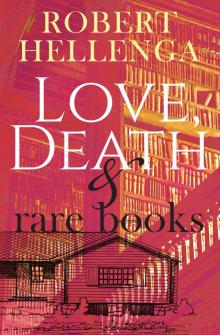 Love, Death & Rare Books
Love, Death & Rare Books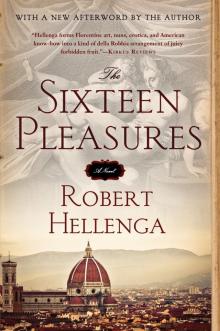 The Sixteen Pleasures
The Sixteen Pleasures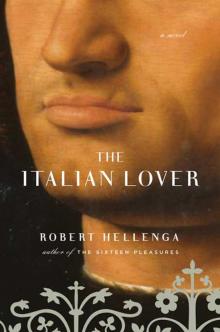 The Italian Lover
The Italian Lover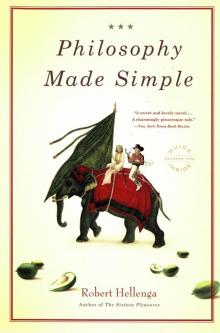 Philosophy Made Simple
Philosophy Made Simple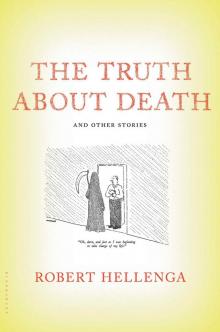 The Truth About Death
The Truth About Death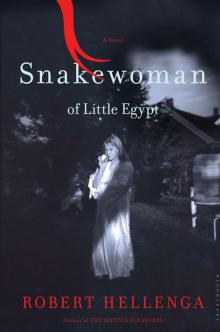 Snakewoman of Little Egypt
Snakewoman of Little Egypt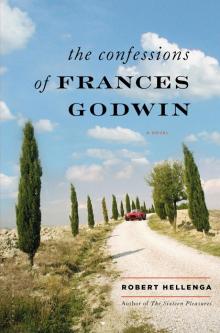 The Confessions of Frances Godwin
The Confessions of Frances Godwin